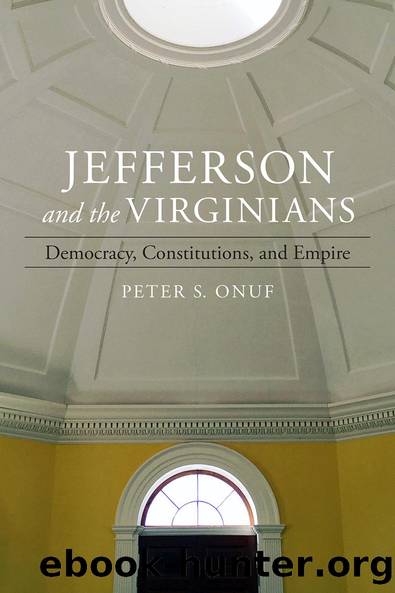Jefferson and the Virginians by Peter Onuf

Author:Peter Onuf [Onuf, Peter]
Language: eng
Format: epub
Tags: History, United States, Revolutionary Period (1775-1800), North America
ISBN: 9780807170557
Google: 7AttDwAAQBAJ
Publisher: LSU Press
Published: 2018-10-10T00:43:59+00:00
IV. GENERATIONS
Over the course of the campaign to draft and ratify the Constitution, Jefferson and Madison conceived of the character of the American people and their role in the expanding federal republic in contrasting ways. Overlooking the endemic factionalism that Madison feared would subvert state governments and destroy the union, Jefferson celebrated the spirit of the people. The coincidental ârevolution in the public opinionâ in France provided an optimistic framework for interpreting American developments that ratification of the Constitution ultimately vindicated. Madison and his allies were able to direct the current of public opinion in a progressive direction, thus overcoming âfactiousâ opposition and widespread skepticism about their own good faith. Ratification logically led Madison to embrace Jeffersonâs narrative of democratic constitutional change. When the American people, acting through their state conventions, ratified the Constitution, they became its true authors. The people had made the Constitution, and they could revise it to suit their changing needs.
Jefferson explored the broad implications of his democratic constitutionalism in an extraordinary letter to Madison from Paris in September 1789. Jefferson famously told Madison that the âearth belongs in usufruct to the livingâ and then went on to elaborate his conception of generational sovereignty.88 According to calculations he based on mortality tables, a new generation appeared roughly every nineteen years, and its coming of age should be marked by drafting a new constitution. This was not, of course, a description of demographic reality, but rather a provocative thought experiment designed to illuminate the fundamental principles of political society. Preoccupied with the practical business of organizing the new federal government, Madison had little inclination to indulge Jeffersonâs theoretical fancies. The two men did spend some time together after Jeffersonâs return from France in November, when Madison recruited his friend to serve in Washingtonâs cabinet as the first secretary of state. Evidently the generation theme did not come up in conversation.89 Madison only responded to Jeffersonâs letter in February, politely but dismissively.90 It might be easy for Jefferson to theorize about writing a new constitution every nineteen years, but it was a prospect the âfatherâ of the recently ratified federal constitution could not happily contemplate.
The exchange between Jefferson and Madison has inspired much excellent scholarship.91 Focusing on the immediate context, most writers understandably highlight the contrasting perspectives of the âphilosophical legislatorâ and the practical politician. By most accounts, Madison makes the most sense. Jeffersonâs call for a periodic return to first principles was a prescription for âanarchyâ and âlicentiousness,â exacerbating endemic factiousness and âsubverting the very foundation of Civil Society.â Jefferson insisted on the right of each generation, âby the law of nature,â to determine its own destiny, freed from the pastâs dead hand: âone generation is to another as one independant nation to another.â92 But generations only existed in Jeffersonâs mind, not in the real world. Starting all over again âat the end of a given termâ risked the âconsequences of an interregnum,â Madison replied. In this period of no government, or state of nature, the âvoice
Download
This site does not store any files on its server. We only index and link to content provided by other sites. Please contact the content providers to delete copyright contents if any and email us, we'll remove relevant links or contents immediately.
| Americas | African Americans |
| Civil War | Colonial Period |
| Immigrants | Revolution & Founding |
| State & Local |
In Cold Blood by Truman Capote(3374)
The Innovators: How a Group of Hackers, Geniuses, and Geeks Created the Digital Revolution by Walter Isaacson(3148)
Steve Jobs by Walter Isaacson(2889)
All the President's Men by Carl Bernstein & Bob Woodward(2364)
Lonely Planet New York City by Lonely Planet(2217)
And the Band Played On by Randy Shilts(2197)
The Room Where It Happened by John Bolton;(2150)
The Poisoner's Handbook by Deborah Blum(2135)
The Innovators by Walter Isaacson(2098)
The Murder of Marilyn Monroe by Jay Margolis(2095)
Lincoln by David Herbert Donald(1982)
A Colony in a Nation by Chris Hayes(1927)
Being George Washington by Beck Glenn(1914)
Under the Banner of Heaven: A Story of Violent Faith by Jon Krakauer(1788)
Amelia Earhart by Doris L. Rich(1689)
The Unsettlers by Mark Sundeen(1682)
Dirt by Bill Buford(1670)
Birdmen by Lawrence Goldstone(1662)
Zeitoun by Dave Eggers(1643)
